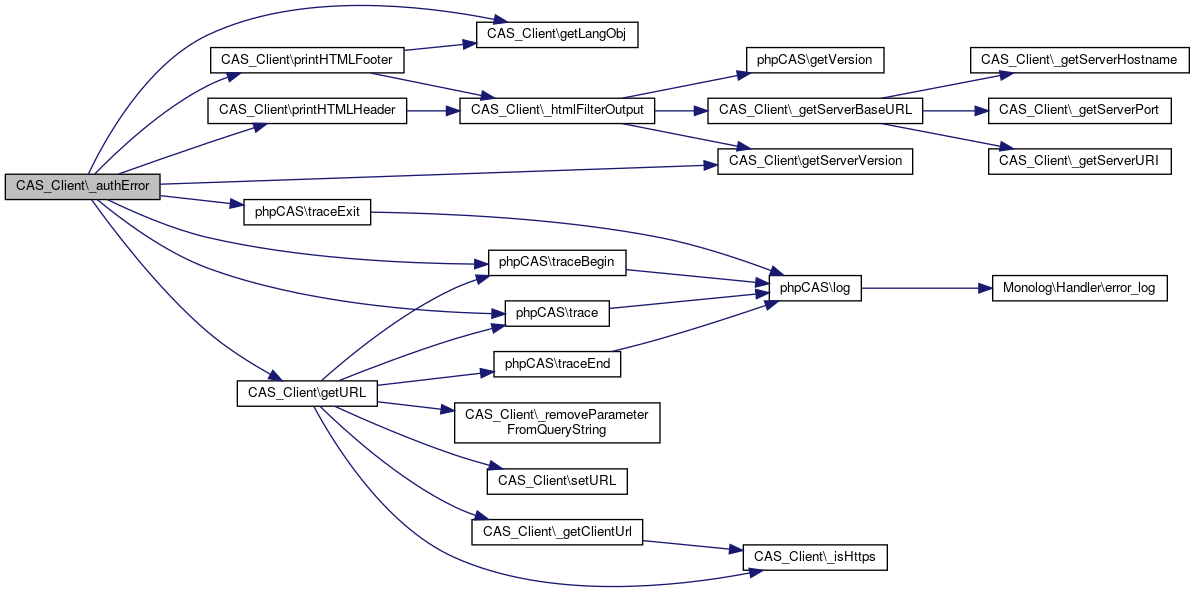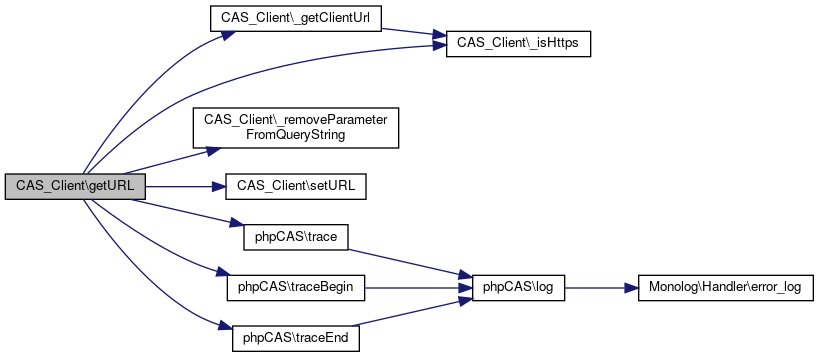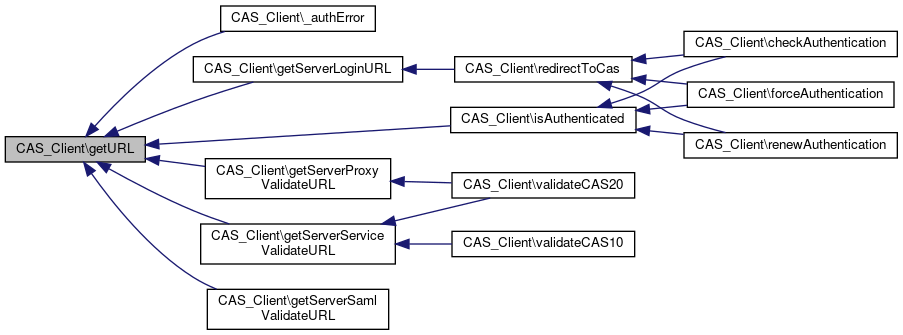 Collaboration diagram for Miscellaneous:
Collaboration diagram for Miscellaneous:Functions | |
| CAS_Client::_readURL ($url, &$headers, &$body, &$err_msg) | |
| This method is used to acces a remote URL. More... | |
| CAS_Client::_buildSAMLPayload () | |
| This method is used to build the SAML POST body sent to /samlValidate URL. More... | |
| CAS_Client::setURL ($url) | |
| This method sets the URL of the current request. More... | |
| CAS_Client::getURL () | |
| This method returns the URL of the current request (without any ticket CGI parameter). More... | |
| CAS_Client::setBaseURL ($url) | |
| This method sets the base URL of the CAS server. More... | |
| CAS_Client::_getClientUrl () | |
| Try to figure out the phpCas client URL with possible Proxys / Ports etc. More... | |
| CAS_Client::_isHttps () | |
| This method checks to see if the request is secured via HTTPS. More... | |
| CAS_Client::_removeParameterFromQueryString ($parameterName, $queryString) | |
| Removes a parameter from a query string. More... | |
| CAS_Client::_buildQueryUrl ($url, $query) | |
| This method is used to append query parameters to an url. More... | |
| CAS_Client::_renameSession ($ticket) | |
| Renaming the session. More... | |
| CAS_Client::_authError ( $failure, $cas_url, $no_response, $bad_response='', $cas_response='', $err_code='', $err_msg='') | |
| This method is used to print the HTML output when the user was not authenticated. More... | |
| CAS_Client::_getNodeType ($nodeURL) | |
| Determine the node type from the URL. More... | |
| CAS_Client::addRebroadcastNode ($rebroadcastNodeUrl) | |
| Store the rebroadcast node for pgtIou/pgtId and logout requests. More... | |
| CAS_Client::addRebroadcastHeader ($header) | |
| This method is used to add header parameters when rebroadcasting pgtIou/pgtId or logoutRequest. More... | |
| CAS_Client::_rebroadcast ($type) | |
| This method rebroadcasts logout/pgtIou requests. More... | |
Variables | |
| CAS_Client::$_url | |
| the URL of the current request (without any ticket CGI parameter). More... | |
| CAS_Client::$_rebroadcast = false | |
| Boolean of whether to rebroadcast pgtIou/pgtId and logoutRequest, and array of the nodes. More... | |
| CAS_Client::$_rebroadcast_nodes = array() | |
| const | CAS_Client::HOSTNAME = 0 |
| Constants used for determining rebroadcast node type. More... | |
| const | CAS_Client::IP = 1 |
| CAS_Client::$_rebroadcast_headers = array() | |
| An array to store extra rebroadcast curl options. More... | |
| const | CAS_Client::LOGOUT = 0 |
| Constants used for determining rebroadcast type (logout or pgtIou/pgtId). More... | |
| const | CAS_Client::PGTIOU = 1 |
Detailed Description
Function Documentation
◆ _authError()
|
private |
This method is used to print the HTML output when the user was not authenticated.
- Parameters
-
string $failure the failure that occured string $cas_url the URL the CAS server was asked for bool $no_response the response from the CAS server (other parameters are ignored if true) bool $bad_response bad response from the CAS server ($err_code and $err_msg ignored if true) string $cas_response the response of the CAS server int $err_code the error code given by the CAS server string $err_msg the error message given by the CAS server
- Returns
- void
Definition at line 3724 of file Client.php.
References $_SERVER, $failure, $lang, CAS_VERSION_1_0, CAS_VERSION_2_0, CAS_VERSION_3_0, CAS_Client\getLangObj(), CAS_Client\getServerVersion(), CAS_Client\getURL(), CAS_Client\printHTMLFooter(), CAS_Client\printHTMLHeader(), phpCAS\trace(), phpCAS\traceBegin(), and phpCAS\traceExit().
 Here is the call graph for this function:
Here is the call graph for this function:◆ _buildQueryUrl()
|
private |
This method is used to append query parameters to an url.
Since the url might already contain parameter it has to be detected and to build a proper URL
- Parameters
-
string $url base url to add the query params to string $query params in query form with & separated
- Returns
- url with query params
Definition at line 3662 of file Client.php.
Referenced by CAS_Client\getServerLoginURL(), CAS_Client\getServerProxyValidateURL(), CAS_Client\getServerSamlValidateURL(), and CAS_Client\getServerServiceValidateURL().
 Here is the caller graph for this function:
Here is the caller graph for this function:◆ _buildSAMLPayload()
|
private |
This method is used to build the SAML POST body sent to /samlValidate URL.
- Returns
- the SOAP-encased SAMLP artifact (the ticket).
Definition at line 2845 of file Client.php.
References CAS_Client\getTicket(), SAML_SOAP_ENV, phpCAS\traceBegin(), and phpCAS\traceEnd().
Referenced by CAS_Client\_readURL().
 Here is the call graph for this function:
Here is the call graph for this function: Here is the caller graph for this function:
Here is the caller graph for this function:◆ _getClientUrl()
|
private |
Try to figure out the phpCas client URL with possible Proxys / Ports etc.
- Returns
- string Server URL with domain:port
Definition at line 3577 of file Client.php.
References $_SERVER, and CAS_Client\_isHttps().
Referenced by CAS_Client\_getCallbackURL(), and CAS_Client\getURL().
 Here is the call graph for this function:
Here is the call graph for this function: Here is the caller graph for this function:
Here is the caller graph for this function:◆ _getNodeType()
|
private |
Determine the node type from the URL.
- Parameters
-
String $nodeURL The node URL.
- Returns
- string hostname
Definition at line 3796 of file Client.php.
References CAS_Client\HOSTNAME, CAS_Client\IP, phpCAS\traceBegin(), and phpCAS\traceEnd().
Referenced by CAS_Client\_rebroadcast().
 Here is the call graph for this function:
Here is the call graph for this function: Here is the caller graph for this function:
Here is the caller graph for this function:◆ _isHttps()
|
private |
This method checks to see if the request is secured via HTTPS.
- Returns
- bool true if https, false otherwise
Definition at line 3617 of file Client.php.
References $_SERVER.
Referenced by CAS_Client\__construct(), CAS_Client\_getClientUrl(), and CAS_Client\getURL().
 Here is the caller graph for this function:
Here is the caller graph for this function:◆ _readURL()
|
private |
This method is used to acces a remote URL.
- Parameters
-
string $url the URL to access. string &$headers an array containing the HTTP header lines of the response (an empty array on failure). string &$body the body of the response, as a string (empty on failure). string &$err_msg an error message, filled on failure.
- Returns
- true on success, false otherwise (in this later case, $err_msg contains an error message).
Definition at line 2790 of file Client.php.
References CAS_Client\$_requestImplementation, $url, CAS_Client\_buildSAMLPayload(), phpCAS\error(), CAS_Client\getServerVersion(), SAML_VERSION_1_1, phpCAS\traceBegin(), and phpCAS\traceEnd().
Referenced by CAS_Client\retrievePT(), CAS_Client\validateCAS10(), and CAS_Client\validateCAS20().
 Here is the call graph for this function:
Here is the call graph for this function: Here is the caller graph for this function:
Here is the caller graph for this function:◆ _rebroadcast()
|
private |
This method rebroadcasts logout/pgtIou requests.
Can be LOGOUT,PGTIOU
- Parameters
-
int $type type of rebroadcasting.
- Returns
- void
Definition at line 3860 of file Client.php.
References $_POST, CAS_Client\$_rebroadcast_nodes, CAS_Client\$_requestImplementation, $_SERVER, $i, $type, $url, CAS_Client\_getNodeType(), CAS_Client\IP, phpCAS\trace(), phpCAS\traceBegin(), and phpCAS\traceEnd().
Referenced by CAS_Client\_wasPreviouslyAuthenticated(), CAS_Client\addRebroadcastNode(), and CAS_Client\handleLogoutRequests().
 Here is the call graph for this function:
Here is the call graph for this function: Here is the caller graph for this function:
Here is the caller graph for this function:◆ _removeParameterFromQueryString()
|
private |
Removes a parameter from a query string.
- Parameters
-
string $parameterName name of parameter string $queryString query string
- Returns
- string new query string
Definition at line 3643 of file Client.php.
Referenced by CAS_Client\getURL().
 Here is the caller graph for this function:
Here is the caller graph for this function:◆ _renameSession()
|
private |
Renaming the session.
- Parameters
-
string $ticket name of the ticket
- Returns
- void
Definition at line 3676 of file Client.php.
References $_SESSION, CAS_Client\getChangeSessionID(), phpCAS\trace(), phpCAS\traceBegin(), and phpCAS\traceEnd().
 Here is the call graph for this function:
Here is the call graph for this function:◆ addRebroadcastHeader()
| CAS_Client::addRebroadcastHeader | ( | $header | ) |
This method is used to add header parameters when rebroadcasting pgtIou/pgtId or logoutRequest.
- Parameters
-
string $header Header to send when rebroadcasting.
- Returns
- void
Definition at line 3839 of file Client.php.
References $header.
◆ addRebroadcastNode()
| CAS_Client::addRebroadcastNode | ( | $rebroadcastNodeUrl | ) |
Store the rebroadcast node for pgtIou/pgtId and logout requests.
- Parameters
-
string $rebroadcastNodeUrl The rebroadcast node URL.
- Returns
- void
Definition at line 3815 of file Client.php.
References CAS_Client\_rebroadcast().
 Here is the call graph for this function:
Here is the call graph for this function:◆ getURL()
| CAS_Client::getURL | ( | ) |
This method returns the URL of the current request (without any ticket CGI parameter).
- Returns
- The URL
Definition at line 3524 of file Client.php.
References $_SERVER, CAS_Client\$_url, CAS_Client\_getClientUrl(), CAS_Client\_isHttps(), CAS_Client\_removeParameterFromQueryString(), CAS_Client\setURL(), phpCAS\trace(), phpCAS\traceBegin(), and phpCAS\traceEnd().
Referenced by CAS_Client\_authError(), CAS_Client\getServerLoginURL(), CAS_Client\getServerProxyValidateURL(), CAS_Client\getServerSamlValidateURL(), CAS_Client\getServerServiceValidateURL(), and CAS_Client\isAuthenticated().
 Here is the call graph for this function:
Here is the call graph for this function: Here is the caller graph for this function:
Here is the caller graph for this function:◆ setBaseURL()
| CAS_Client::setBaseURL | ( | $url | ) |
This method sets the base URL of the CAS server.
- Parameters
-
string $url the base URL
- Returns
- string base url
Definition at line 3562 of file Client.php.
References $url.
◆ setURL()
| CAS_Client::setURL | ( | $url | ) |
This method sets the URL of the current request.
- Parameters
-
string $url url to set for service
- Returns
- void
Definition at line 3509 of file Client.php.
References $url.
Referenced by CAS_Client\getURL().
 Here is the caller graph for this function:
Here is the caller graph for this function:Variable Documentation
◆ $_rebroadcast
|
private |
Boolean of whether to rebroadcast pgtIou/pgtId and logoutRequest, and array of the nodes.
Definition at line 3779 of file Client.php.
◆ $_rebroadcast_headers
|
private |
An array to store extra rebroadcast curl options.
Definition at line 3829 of file Client.php.
◆ $_rebroadcast_nodes
|
private |
Definition at line 3780 of file Client.php.
Referenced by CAS_Client\_rebroadcast().
◆ $_url
|
private |
the URL of the current request (without any ticket CGI parameter).
Written and read by CAS_Client::getURL().
Definition at line 3499 of file Client.php.
Referenced by CAS_Client\getURL().
◆ HOSTNAME
| const CAS_Client::HOSTNAME = 0 |
Constants used for determining rebroadcast node type.
Definition at line 3785 of file Client.php.
Referenced by CAS_Client\_getNodeType().
◆ IP
| const CAS_Client::IP = 1 |
Definition at line 3786 of file Client.php.
Referenced by CAS_Client\_getNodeType(), and CAS_Client\_rebroadcast().
◆ LOGOUT
| const CAS_Client::LOGOUT = 0 |
Constants used for determining rebroadcast type (logout or pgtIou/pgtId).
Definition at line 3850 of file Client.php.
◆ PGTIOU
| const CAS_Client::PGTIOU = 1 |
Definition at line 3851 of file Client.php.




















